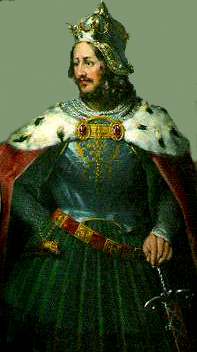William of Winchester
| William of Winchester | |
|---|---|
| Lord of Lüneburg | |

19th century portrait
|
|
| Spouse(s) | Helena of Denmark |
| Issue | |
| Noble family | House of Welf |
| Father | Henry the Lion |
| Mother | Matilda of England |
| Born |
11 April 1184 Winchester, England |
| Died | 13 December 1213 (aged 29) Lüneburg, Saxony |
William of Winchester (11 April 1184 – 13 December 1213), also called William of Lüneburg (German: Wilhelm von Lüneburg) or William Longsword, a member of the House of Welf, was heir to his family's allodial lands in the Duchy of Saxony after the deposition of his father, Duke Henry the Lion in 1180.
William was the fifth and youngest son of Henry the Lion and Matilda, the eldest daughter of King Henry II of England. He was born in Winchester, England during his father's exile; he probably remained there when Henry returned to Saxony and was raised at King Richard's court.
After his unsuccessful uprising, Henry had submitted to the Hohenstaufen emperor Frederick Barbarossa in 1181 and though he had to leave Germany, he could retain the Welf possessions around Lüneburg, Braunschweig, and Haldensleben. He finally reconciled with Frederick's son and successor Emperor Henry VI in 1194 and surrendered his younger sons William and Otto as hostages for the payment of the ransom for the release of their uncle King Richard. William was extradited to Duke Leopold V of Austria and temporarily held in Hungary.
...
Wikipedia
